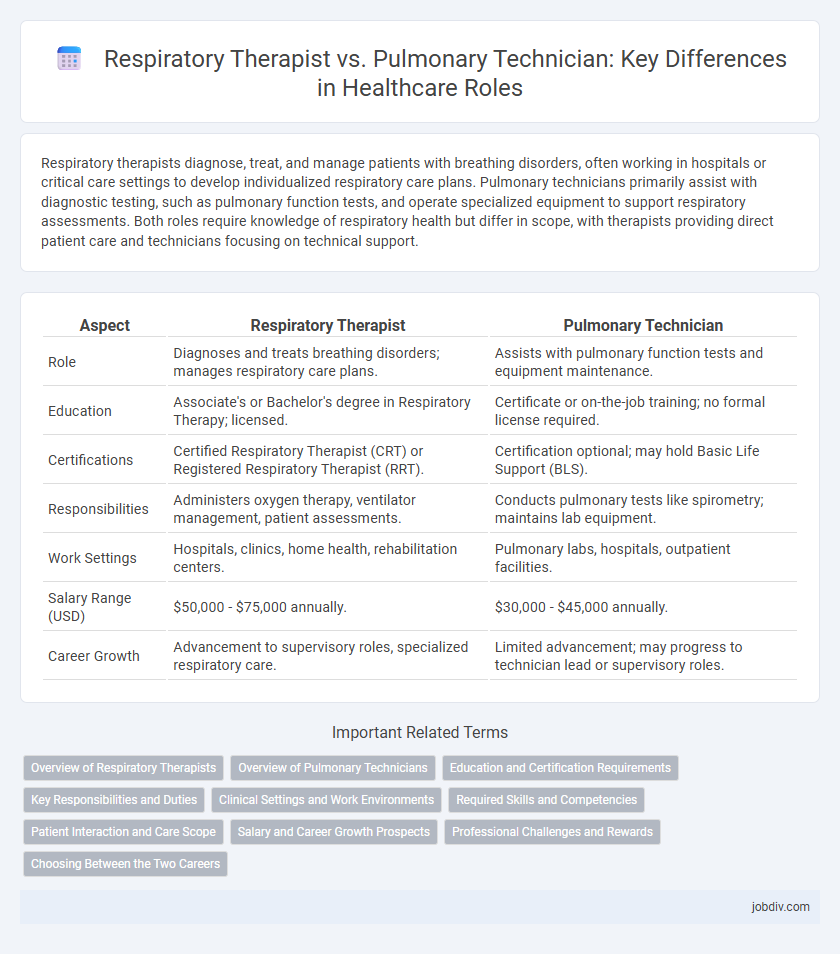Respiratory therapists diagnose, treat, and manage patients with breathing disorders, often working in hospitals or critical care settings to develop individualized respiratory care plans. Pulmonary technicians primarily assist with diagnostic testing, such as pulmonary function tests, and operate specialized equipment to support respiratory assessments. Both roles require knowledge of respiratory health but differ in scope, with therapists providing direct patient care and technicians focusing on technical support.
Table of Comparison
| Aspect | Respiratory Therapist | Pulmonary Technician |
|---|---|---|
| Role | Diagnoses and treats breathing disorders; manages respiratory care plans. | Assists with pulmonary function tests and equipment maintenance. |
| Education | Associate's or Bachelor's degree in Respiratory Therapy; licensed. | Certificate or on-the-job training; no formal license required. |
| Certifications | Certified Respiratory Therapist (CRT) or Registered Respiratory Therapist (RRT). | Certification optional; may hold Basic Life Support (BLS). |
| Responsibilities | Administers oxygen therapy, ventilator management, patient assessments. | Conducts pulmonary tests like spirometry; maintains lab equipment. |
| Work Settings | Hospitals, clinics, home health, rehabilitation centers. | Pulmonary labs, hospitals, outpatient facilities. |
| Salary Range (USD) | $50,000 - $75,000 annually. | $30,000 - $45,000 annually. |
| Career Growth | Advancement to supervisory roles, specialized respiratory care. | Limited advancement; may progress to technician lead or supervisory roles. |
Overview of Respiratory Therapists
Respiratory therapists specialize in evaluating, treating, and caring for patients with breathing difficulties and cardiopulmonary disorders, often working in hospitals, clinics, and rehabilitation centers. They administer oxygen therapy, manage ventilators, and conduct diagnostic tests like arterial blood gas analysis to monitor lung function. Their advanced training and licensure differentiate them from pulmonary technicians, who primarily assist with equipment operation and basic patient support tasks.
Overview of Pulmonary Technicians
Pulmonary Technicians play a critical role in respiratory care by conducting diagnostic tests such as pulmonary function tests (PFTs) and arterial blood gases (ABGs), helping physicians assess lung function and manage respiratory conditions. Unlike Respiratory Therapists who provide a broader range of therapeutic interventions, Pulmonary Technicians primarily focus on the technical operation and maintenance of respiratory equipment and diagnostic procedures. Their expertise supports accurate diagnosis and monitoring of pulmonary diseases, contributing to effective treatment planning in healthcare settings.
Education and Certification Requirements
Respiratory Therapists typically hold an associate's or bachelor's degree in respiratory therapy and must obtain certification through the National Board for Respiratory Care (NBRC), earning credentials such as the Certified Respiratory Therapist (CRT) or Registered Respiratory Therapist (RRT). Pulmonary Technicians usually require a diploma or certificate in pulmonary function technology and may acquire credentials from bodies like the American Association for Respiratory Care (AARC) or the National Board for Respiratory Care's specialized exams. Both roles demand clinical training, but Respiratory Therapists have more extensive education and broader certification requirements reflecting their advanced responsibilities in respiratory care.
Key Responsibilities and Duties
Respiratory Therapists assess, treat, and care for patients with breathing or cardiopulmonary disorders, performing diagnostic tests and managing ventilators in clinical settings. Pulmonary Technicians primarily assist with diagnostic procedures such as pulmonary function testing, collecting patient data, and maintaining respiratory equipment. Both roles require knowledge of respiratory care, but Respiratory Therapists have broader clinical responsibilities including patient assessment and treatment planning.
Clinical Settings and Work Environments
Respiratory therapists primarily work in clinical settings such as hospitals, intensive care units, and pulmonary rehabilitation centers, where they provide direct patient care and manage complex respiratory treatments. Pulmonary technicians typically operate in diagnostic laboratories and outpatient facilities, focusing on performing lung function tests and assisting physicians with pulmonary diagnostics. Both professionals contribute to respiratory health but differ in work environments and patient interaction levels.
Required Skills and Competencies
Respiratory Therapists require comprehensive knowledge in cardiopulmonary anatomy, patient assessment, and advanced therapeutic techniques, with strong skills in ventilator management and emergency response. Pulmonary Technicians focus on operating diagnostic equipment, performing pulmonary function tests, and collecting patient data, emphasizing technical proficiency and attention to detail. Both roles demand excellent communication, problem-solving abilities, and adherence to healthcare protocols for effective respiratory care.
Patient Interaction and Care Scope
Respiratory Therapists engage directly with patients to assess, manage, and treat complex respiratory conditions using tailored care plans and advanced therapeutic techniques. Pulmonary Technicians primarily perform diagnostic tests and assist with equipment maintenance, contributing to patient care by providing essential data but with less direct patient interaction. The scope of a Respiratory Therapist includes comprehensive patient education and ongoing management, whereas Pulmonary Technicians support clinical decision-making through technical expertise.
Salary and Career Growth Prospects
Respiratory Therapists typically earn a median annual salary of around $65,000, reflecting higher educational requirements and scope of practice compared to Pulmonary Technicians, who average approximately $45,000 per year. Career growth prospects for Respiratory Therapists are strong due to increasing demand in healthcare settings and the ability to specialize in areas such as neonatal or cardiopulmonary care. Pulmonary Technicians have opportunities primarily in diagnostic testing and equipment management but face more limited advancement potential without further certification or education.
Professional Challenges and Rewards
Respiratory therapists face complex professional challenges such as managing critical patient care and interpreting advanced respiratory diagnostics, which demand extensive clinical knowledge and decision-making skills. Pulmonary technicians often encounter challenges related to maintaining precise pulmonary function testing equipment and ensuring accurate test administration under time constraints. Both roles offer rewarding opportunities to improve patient respiratory health, with respiratory therapists directly influencing treatment outcomes and pulmonary technicians contributing essential diagnostic support.
Choosing Between the Two Careers
Respiratory therapists typically hold advanced certifications and possess extensive clinical training, allowing them to deliver comprehensive patient care, including managing ventilators and administering respiratory therapy. Pulmonary technicians often perform diagnostic tests like pulmonary function assessments under the supervision of healthcare providers and require less formal education. Choosing between these careers depends on the desired scope of practice, educational commitment, and patient interaction level within respiratory healthcare settings.
Respiratory Therapist vs Pulmonary Technician Infographic

 jobdiv.com
jobdiv.com